HLTH101 Assessment 1: Report on BMJ Journal's Reliability and Validity
VerifiedAdded on 2023/04/07
|6
|1123
|480
Report
AI Summary
This report assesses the British Medical Journal (BMJ) as a reliable source of medical information, fulfilling the requirements of HLTH101. The student selected BMJ due to its high impact factor and evidence-based approach. The report details BMJ's editorial policies, adherence to open access principles, and rigorous peer review process, highlighting how these elements ensure the robustness of published information. It discusses the journal's reliability, acknowledging past controversies but emphasizing its overall credibility. The report evaluates BMJ's validity, citing its comprehensive peer review, pro-science approach, and indexing in major databases. The conclusion reinforces BMJ's status as a preferred journal for healthcare professionals, providing relevant and evidence-based information for clinical practice. The report includes an abstract, introduction, selection criteria, discussion of editorial policies, reliability, validity, conclusion, and references. It critically evaluates the source knowledge base and presents a clear discussion of editorial and peer review processes.

Assessment 1 - Report
By Student’s Name
Course
Tutor
Institution
Date
Word count
By Student’s Name
Course
Tutor
Institution
Date
Word count
Paraphrase This Document
Need a fresh take? Get an instant paraphrase of this document with our AI Paraphraser
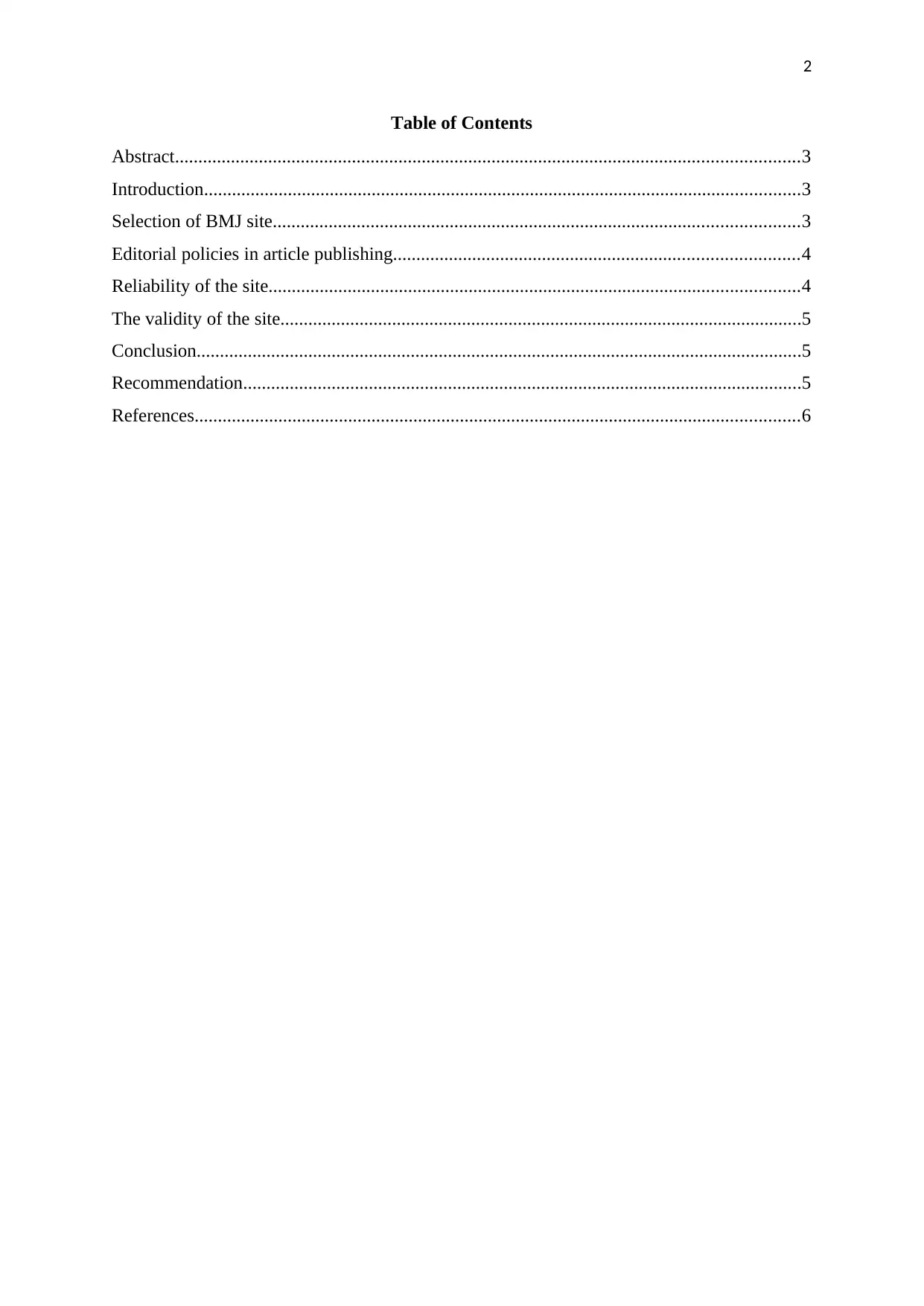
2
Table of Contents
Abstract......................................................................................................................................3
Introduction................................................................................................................................3
Selection of BMJ site.................................................................................................................3
Editorial policies in article publishing.......................................................................................4
Reliability of the site..................................................................................................................4
The validity of the site................................................................................................................5
Conclusion..................................................................................................................................5
Recommendation........................................................................................................................5
References..................................................................................................................................6
Table of Contents
Abstract......................................................................................................................................3
Introduction................................................................................................................................3
Selection of BMJ site.................................................................................................................3
Editorial policies in article publishing.......................................................................................4
Reliability of the site..................................................................................................................4
The validity of the site................................................................................................................5
Conclusion..................................................................................................................................5
Recommendation........................................................................................................................5
References..................................................................................................................................6
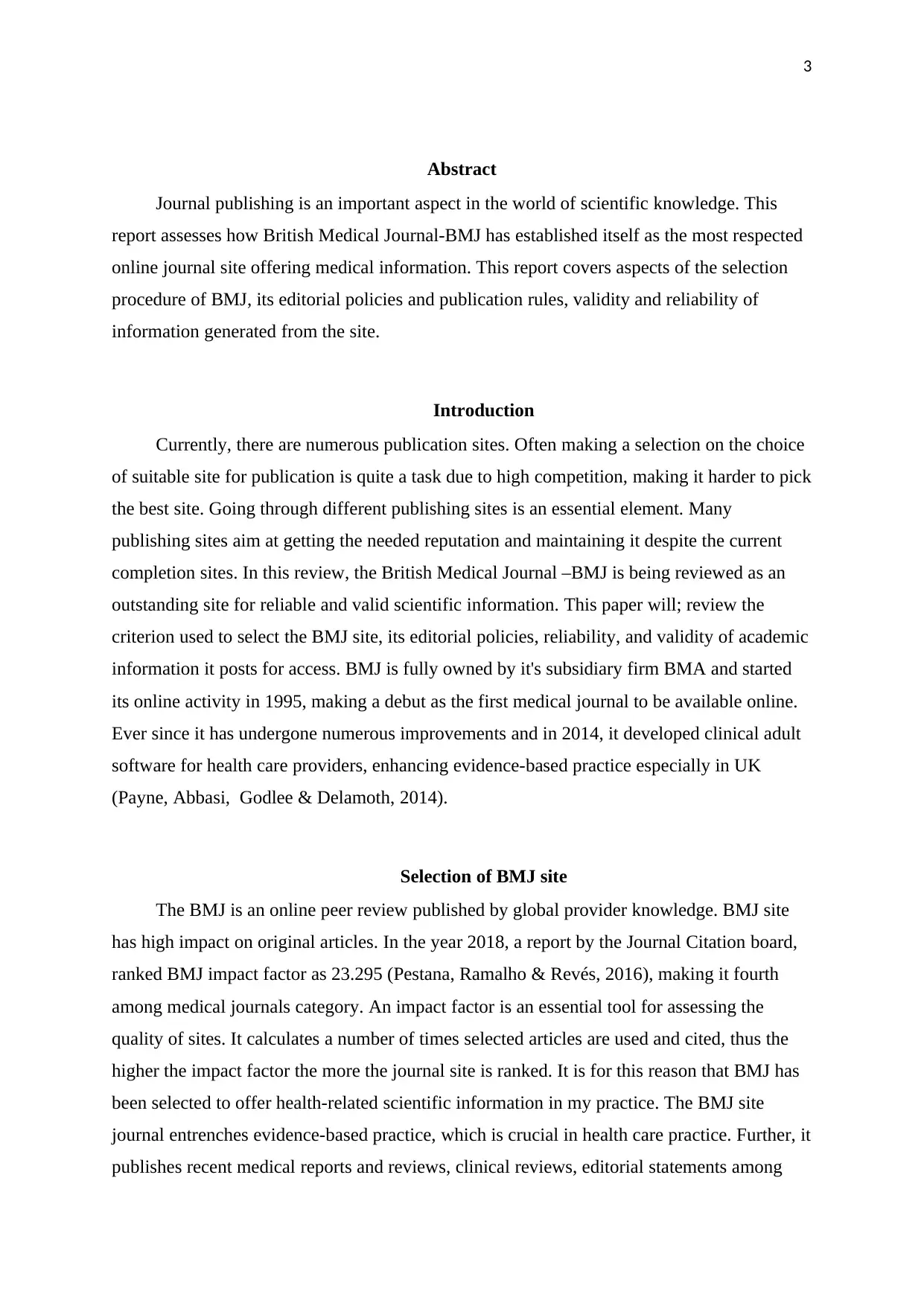
3
Abstract
Journal publishing is an important aspect in the world of scientific knowledge. This
report assesses how British Medical Journal-BMJ has established itself as the most respected
online journal site offering medical information. This report covers aspects of the selection
procedure of BMJ, its editorial policies and publication rules, validity and reliability of
information generated from the site.
Introduction
Currently, there are numerous publication sites. Often making a selection on the choice
of suitable site for publication is quite a task due to high competition, making it harder to pick
the best site. Going through different publishing sites is an essential element. Many
publishing sites aim at getting the needed reputation and maintaining it despite the current
completion sites. In this review, the British Medical Journal –BMJ is being reviewed as an
outstanding site for reliable and valid scientific information. This paper will; review the
criterion used to select the BMJ site, its editorial policies, reliability, and validity of academic
information it posts for access. BMJ is fully owned by it's subsidiary firm BMA and started
its online activity in 1995, making a debut as the first medical journal to be available online.
Ever since it has undergone numerous improvements and in 2014, it developed clinical adult
software for health care providers, enhancing evidence-based practice especially in UK
(Payne, Abbasi, Godlee & Delamoth, 2014).
Selection of BMJ site
The BMJ is an online peer review published by global provider knowledge. BMJ site
has high impact on original articles. In the year 2018, a report by the Journal Citation board,
ranked BMJ impact factor as 23.295 (Pestana, Ramalho & Revés, 2016), making it fourth
among medical journals category. An impact factor is an essential tool for assessing the
quality of sites. It calculates a number of times selected articles are used and cited, thus the
higher the impact factor the more the journal site is ranked. It is for this reason that BMJ has
been selected to offer health-related scientific information in my practice. The BMJ site
journal entrenches evidence-based practice, which is crucial in health care practice. Further, it
publishes recent medical reports and reviews, clinical reviews, editorial statements among
Abstract
Journal publishing is an important aspect in the world of scientific knowledge. This
report assesses how British Medical Journal-BMJ has established itself as the most respected
online journal site offering medical information. This report covers aspects of the selection
procedure of BMJ, its editorial policies and publication rules, validity and reliability of
information generated from the site.
Introduction
Currently, there are numerous publication sites. Often making a selection on the choice
of suitable site for publication is quite a task due to high competition, making it harder to pick
the best site. Going through different publishing sites is an essential element. Many
publishing sites aim at getting the needed reputation and maintaining it despite the current
completion sites. In this review, the British Medical Journal –BMJ is being reviewed as an
outstanding site for reliable and valid scientific information. This paper will; review the
criterion used to select the BMJ site, its editorial policies, reliability, and validity of academic
information it posts for access. BMJ is fully owned by it's subsidiary firm BMA and started
its online activity in 1995, making a debut as the first medical journal to be available online.
Ever since it has undergone numerous improvements and in 2014, it developed clinical adult
software for health care providers, enhancing evidence-based practice especially in UK
(Payne, Abbasi, Godlee & Delamoth, 2014).
Selection of BMJ site
The BMJ is an online peer review published by global provider knowledge. BMJ site
has high impact on original articles. In the year 2018, a report by the Journal Citation board,
ranked BMJ impact factor as 23.295 (Pestana, Ramalho & Revés, 2016), making it fourth
among medical journals category. An impact factor is an essential tool for assessing the
quality of sites. It calculates a number of times selected articles are used and cited, thus the
higher the impact factor the more the journal site is ranked. It is for this reason that BMJ has
been selected to offer health-related scientific information in my practice. The BMJ site
journal entrenches evidence-based practice, which is crucial in health care practice. Further, it
publishes recent medical reports and reviews, clinical reviews, editorial statements among
⊘ This is a preview!⊘
Do you want full access?
Subscribe today to unlock all pages.

Trusted by 1+ million students worldwide
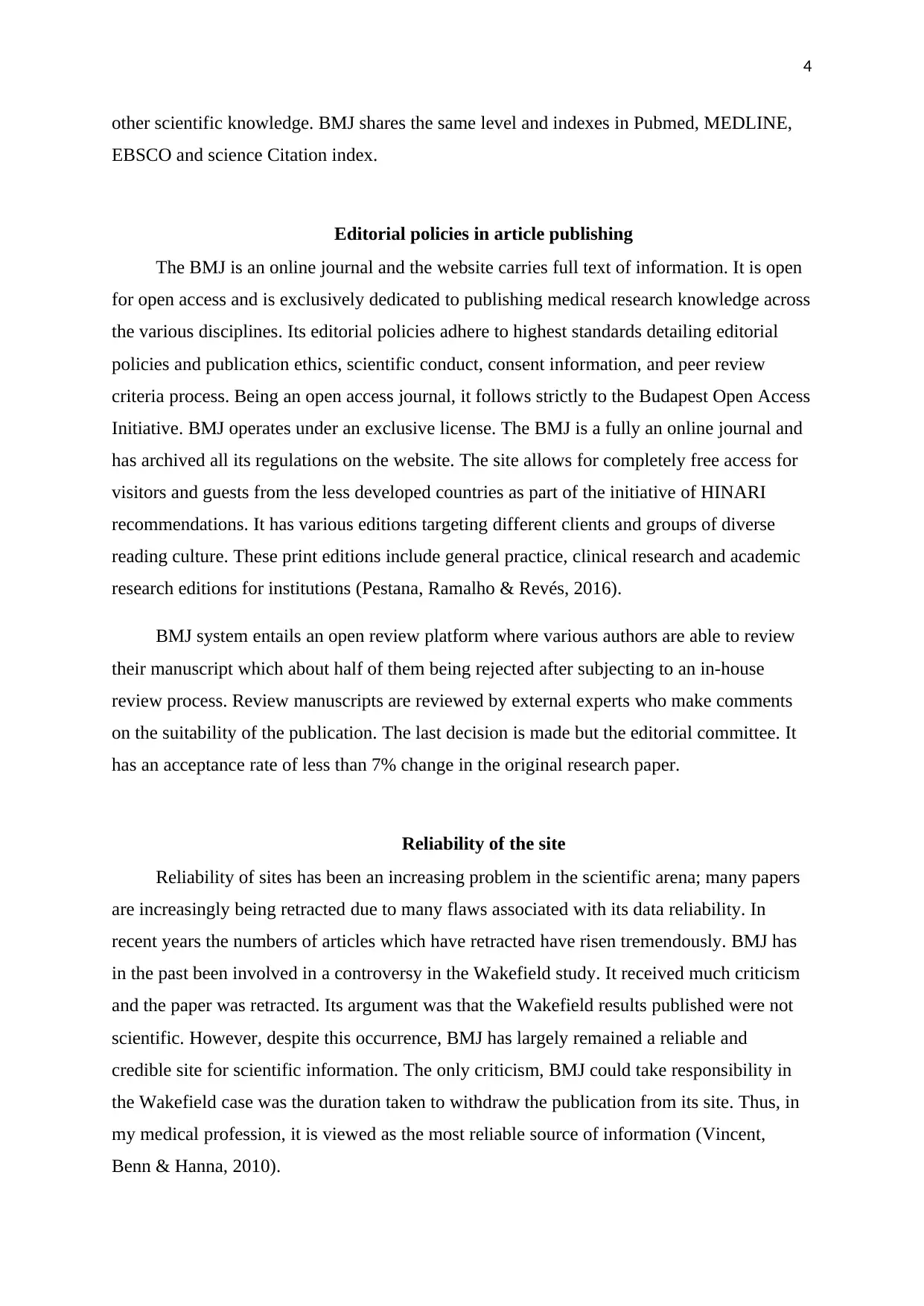
4
other scientific knowledge. BMJ shares the same level and indexes in Pubmed, MEDLINE,
EBSCO and science Citation index.
Editorial policies in article publishing
The BMJ is an online journal and the website carries full text of information. It is open
for open access and is exclusively dedicated to publishing medical research knowledge across
the various disciplines. Its editorial policies adhere to highest standards detailing editorial
policies and publication ethics, scientific conduct, consent information, and peer review
criteria process. Being an open access journal, it follows strictly to the Budapest Open Access
Initiative. BMJ operates under an exclusive license. The BMJ is a fully an online journal and
has archived all its regulations on the website. The site allows for completely free access for
visitors and guests from the less developed countries as part of the initiative of HINARI
recommendations. It has various editions targeting different clients and groups of diverse
reading culture. These print editions include general practice, clinical research and academic
research editions for institutions (Pestana, Ramalho & Revés, 2016).
BMJ system entails an open review platform where various authors are able to review
their manuscript which about half of them being rejected after subjecting to an in-house
review process. Review manuscripts are reviewed by external experts who make comments
on the suitability of the publication. The last decision is made but the editorial committee. It
has an acceptance rate of less than 7% change in the original research paper.
Reliability of the site
Reliability of sites has been an increasing problem in the scientific arena; many papers
are increasingly being retracted due to many flaws associated with its data reliability. In
recent years the numbers of articles which have retracted have risen tremendously. BMJ has
in the past been involved in a controversy in the Wakefield study. It received much criticism
and the paper was retracted. Its argument was that the Wakefield results published were not
scientific. However, despite this occurrence, BMJ has largely remained a reliable and
credible site for scientific information. The only criticism, BMJ could take responsibility in
the Wakefield case was the duration taken to withdraw the publication from its site. Thus, in
my medical profession, it is viewed as the most reliable source of information (Vincent,
Benn & Hanna, 2010).
other scientific knowledge. BMJ shares the same level and indexes in Pubmed, MEDLINE,
EBSCO and science Citation index.
Editorial policies in article publishing
The BMJ is an online journal and the website carries full text of information. It is open
for open access and is exclusively dedicated to publishing medical research knowledge across
the various disciplines. Its editorial policies adhere to highest standards detailing editorial
policies and publication ethics, scientific conduct, consent information, and peer review
criteria process. Being an open access journal, it follows strictly to the Budapest Open Access
Initiative. BMJ operates under an exclusive license. The BMJ is a fully an online journal and
has archived all its regulations on the website. The site allows for completely free access for
visitors and guests from the less developed countries as part of the initiative of HINARI
recommendations. It has various editions targeting different clients and groups of diverse
reading culture. These print editions include general practice, clinical research and academic
research editions for institutions (Pestana, Ramalho & Revés, 2016).
BMJ system entails an open review platform where various authors are able to review
their manuscript which about half of them being rejected after subjecting to an in-house
review process. Review manuscripts are reviewed by external experts who make comments
on the suitability of the publication. The last decision is made but the editorial committee. It
has an acceptance rate of less than 7% change in the original research paper.
Reliability of the site
Reliability of sites has been an increasing problem in the scientific arena; many papers
are increasingly being retracted due to many flaws associated with its data reliability. In
recent years the numbers of articles which have retracted have risen tremendously. BMJ has
in the past been involved in a controversy in the Wakefield study. It received much criticism
and the paper was retracted. Its argument was that the Wakefield results published were not
scientific. However, despite this occurrence, BMJ has largely remained a reliable and
credible site for scientific information. The only criticism, BMJ could take responsibility in
the Wakefield case was the duration taken to withdraw the publication from its site. Thus, in
my medical profession, it is viewed as the most reliable source of information (Vincent,
Benn & Hanna, 2010).
Paraphrase This Document
Need a fresh take? Get an instant paraphrase of this document with our AI Paraphraser
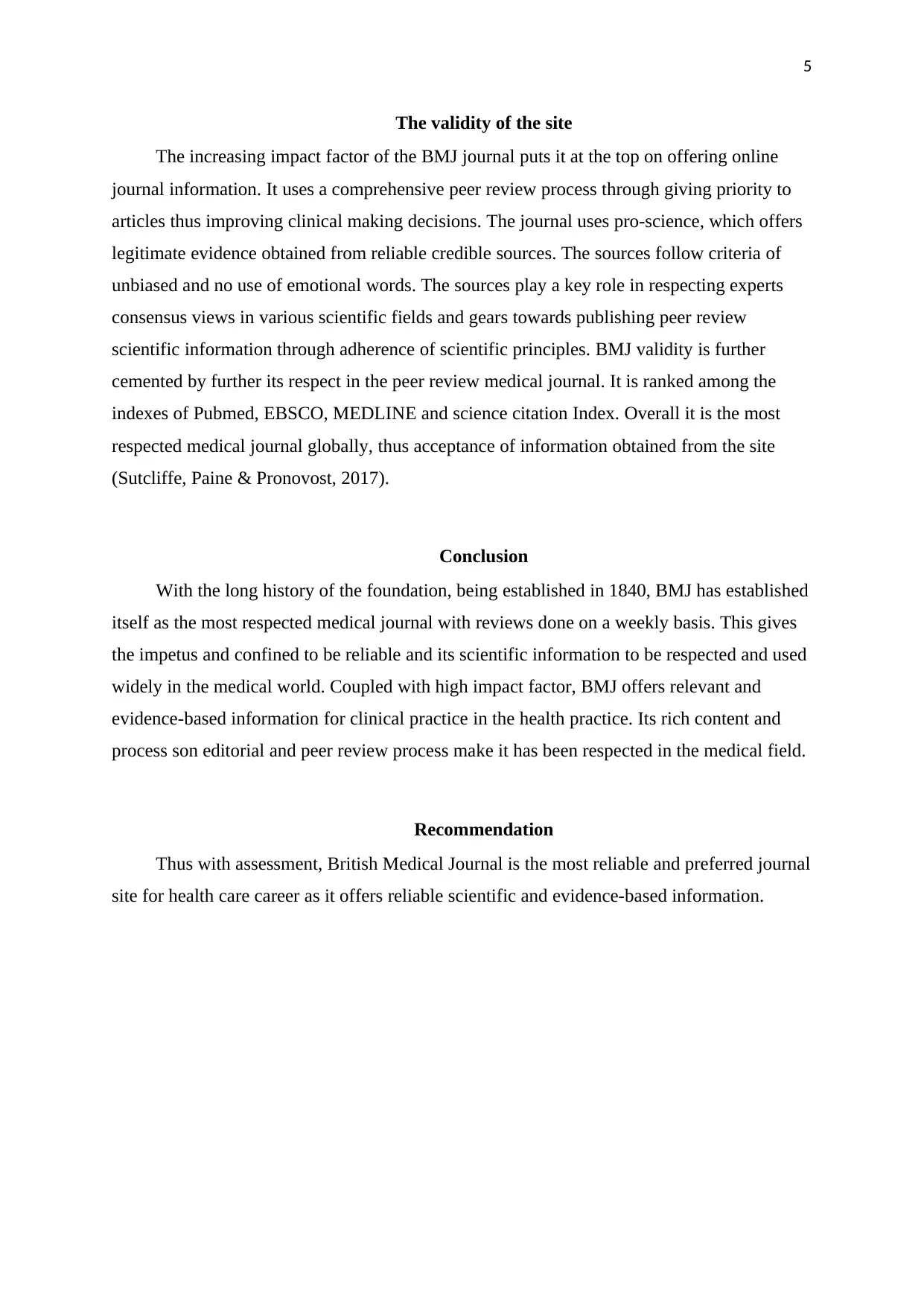
5
The validity of the site
The increasing impact factor of the BMJ journal puts it at the top on offering online
journal information. It uses a comprehensive peer review process through giving priority to
articles thus improving clinical making decisions. The journal uses pro-science, which offers
legitimate evidence obtained from reliable credible sources. The sources follow criteria of
unbiased and no use of emotional words. The sources play a key role in respecting experts
consensus views in various scientific fields and gears towards publishing peer review
scientific information through adherence of scientific principles. BMJ validity is further
cemented by further its respect in the peer review medical journal. It is ranked among the
indexes of Pubmed, EBSCO, MEDLINE and science citation Index. Overall it is the most
respected medical journal globally, thus acceptance of information obtained from the site
(Sutcliffe, Paine & Pronovost, 2017).
Conclusion
With the long history of the foundation, being established in 1840, BMJ has established
itself as the most respected medical journal with reviews done on a weekly basis. This gives
the impetus and confined to be reliable and its scientific information to be respected and used
widely in the medical world. Coupled with high impact factor, BMJ offers relevant and
evidence-based information for clinical practice in the health practice. Its rich content and
process son editorial and peer review process make it has been respected in the medical field.
Recommendation
Thus with assessment, British Medical Journal is the most reliable and preferred journal
site for health care career as it offers reliable scientific and evidence-based information.
The validity of the site
The increasing impact factor of the BMJ journal puts it at the top on offering online
journal information. It uses a comprehensive peer review process through giving priority to
articles thus improving clinical making decisions. The journal uses pro-science, which offers
legitimate evidence obtained from reliable credible sources. The sources follow criteria of
unbiased and no use of emotional words. The sources play a key role in respecting experts
consensus views in various scientific fields and gears towards publishing peer review
scientific information through adherence of scientific principles. BMJ validity is further
cemented by further its respect in the peer review medical journal. It is ranked among the
indexes of Pubmed, EBSCO, MEDLINE and science citation Index. Overall it is the most
respected medical journal globally, thus acceptance of information obtained from the site
(Sutcliffe, Paine & Pronovost, 2017).
Conclusion
With the long history of the foundation, being established in 1840, BMJ has established
itself as the most respected medical journal with reviews done on a weekly basis. This gives
the impetus and confined to be reliable and its scientific information to be respected and used
widely in the medical world. Coupled with high impact factor, BMJ offers relevant and
evidence-based information for clinical practice in the health practice. Its rich content and
process son editorial and peer review process make it has been respected in the medical field.
Recommendation
Thus with assessment, British Medical Journal is the most reliable and preferred journal
site for health care career as it offers reliable scientific and evidence-based information.
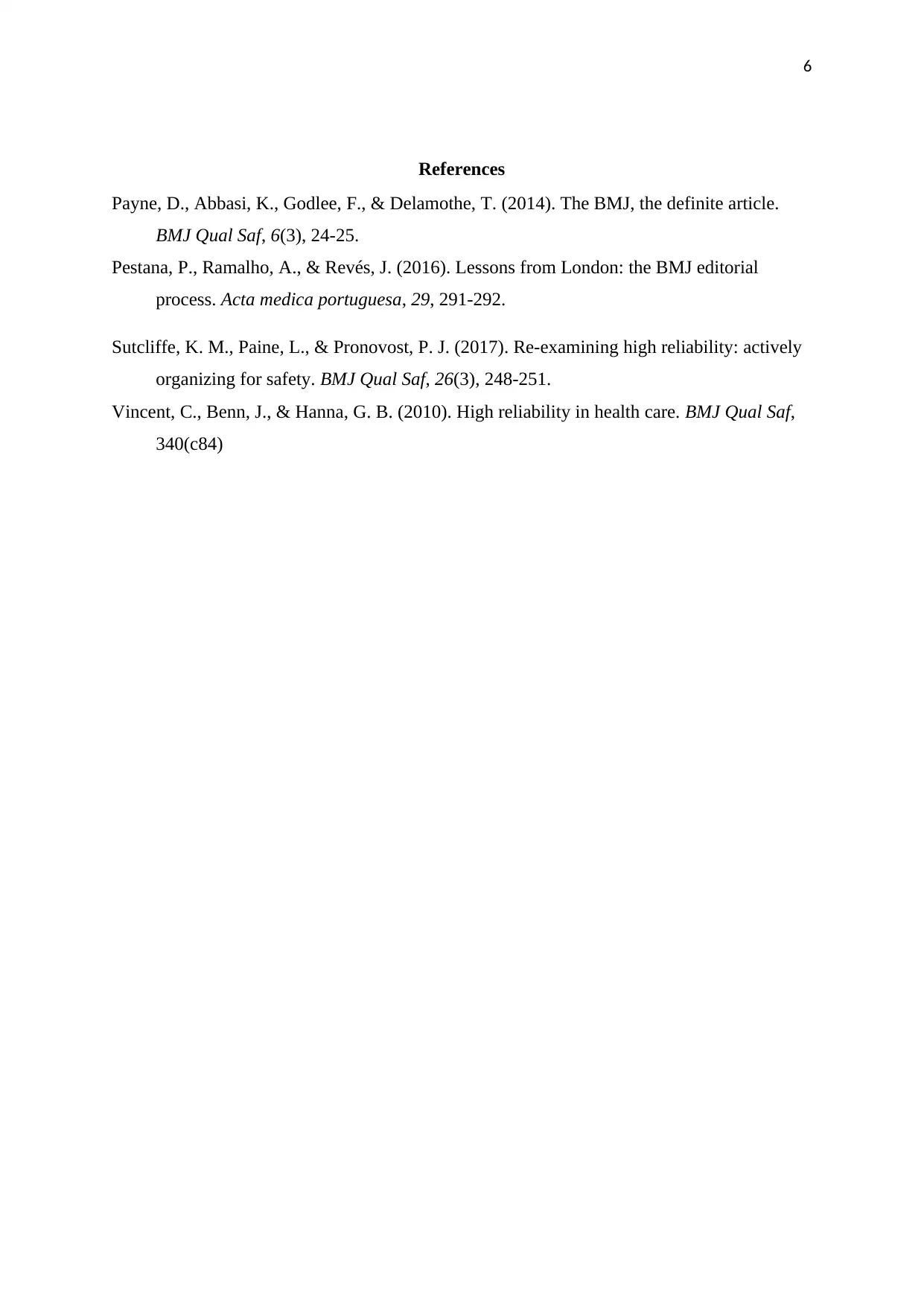
6
References
Payne, D., Abbasi, K., Godlee, F., & Delamothe, T. (2014). The BMJ, the definite article.
BMJ Qual Saf, 6(3), 24-25.
Pestana, P., Ramalho, A., & Revés, J. (2016). Lessons from London: the BMJ editorial
process. Acta medica portuguesa, 29, 291-292.
Sutcliffe, K. M., Paine, L., & Pronovost, P. J. (2017). Re-examining high reliability: actively
organizing for safety. BMJ Qual Saf, 26(3), 248-251.
Vincent, C., Benn, J., & Hanna, G. B. (2010). High reliability in health care. BMJ Qual Saf,
340(c84)
References
Payne, D., Abbasi, K., Godlee, F., & Delamothe, T. (2014). The BMJ, the definite article.
BMJ Qual Saf, 6(3), 24-25.
Pestana, P., Ramalho, A., & Revés, J. (2016). Lessons from London: the BMJ editorial
process. Acta medica portuguesa, 29, 291-292.
Sutcliffe, K. M., Paine, L., & Pronovost, P. J. (2017). Re-examining high reliability: actively
organizing for safety. BMJ Qual Saf, 26(3), 248-251.
Vincent, C., Benn, J., & Hanna, G. B. (2010). High reliability in health care. BMJ Qual Saf,
340(c84)
⊘ This is a preview!⊘
Do you want full access?
Subscribe today to unlock all pages.

Trusted by 1+ million students worldwide
1 out of 6
Related Documents
Your All-in-One AI-Powered Toolkit for Academic Success.
+13062052269
info@desklib.com
Available 24*7 on WhatsApp / Email
![[object Object]](/_next/static/media/star-bottom.7253800d.svg)
Unlock your academic potential
Copyright © 2020–2026 A2Z Services. All Rights Reserved. Developed and managed by ZUCOL.





